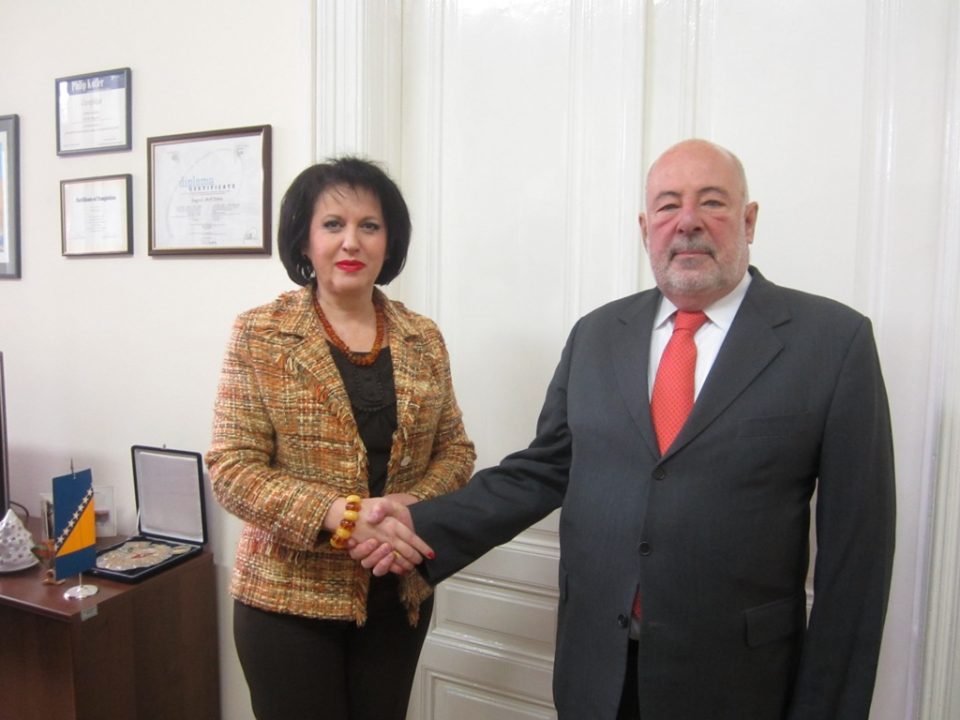INTERVIEW: MANOEL GOMES-PEREIRA, AMBASSADOR OF BRAZIL IN BIH
Interviewed by: Ajsela ZAHIROVIĆ
SARAJEVO, December 13 (ONASA) – Ambassador of Brazil in BiH in the interview for the Agency ONASA talks, among other things, about the possibilities of improving relations between BiH and Brazil, especially in the economic sector, cooperation and joint appearance on the tourist market, and plan to increase coffee production in Brazil since some studies show that the world is threatened with the shortage of coffee …
ONASA: Whether and to what extent is it possible to improve the relations between BiH and Brazil, especially in the economic sector?
GOMES-PEREIRA: In Bosnia and Herzegovina, Brazil is best known for its sports history, especially football. When you talk about Brazil, you talk about Pele, Ronaldo, Neymar.
Products connected to Brazil are also coffee and sugar that are available in supermarkets.
The bilateral commerce between our two countries has a very small scope, however with big possibilities for increasing it.
Brazil exports some primary products, semi-finished goods, and machines, and we import manufactured products. In the near future, it is my intention to organize a commercial and investment mission that could visit BiH and explore business opportunities in this country.
ONASA: It is known that BiH and Brazil are attractive tourist destinations. Is there a possibility of mutual cooperation and joint appearance on the tourist market?
GOMES-PEREIRA: Both Brazil and BiH are famous for their natural beauties, generosity of their people, and the possibility for the practice of extreme sports.
I believe that an agreement on tourism cooperation would be the first step to approximate the two countries in the area of tourism.
This agreement would include the exchange of economic and social information in the area of tourism, the information about investments, and about various tourist destinations that both Brazil and BiH have to offer.
I remind you that Catholicism is Brazil’s main religion, and one of the places the Brazilian religious tourists visit in Europe is Medjugorje, which is being promoted in this way in Brazil.
Religious tourism customers are usually the retired and the seniors, which make use of the low season, less expensive prices, thus contributing to maintaining the flux of tourists (and the employment in this sector) year round.
ONASA: How does the fact that BiH has no embassy in Brazil slows down economic and other forms of cooperation?
GOMES-PEREIRA: Brazil opened its Embassy in Sarajevo in July 2011. I am the second Ambassador of Brazil to BiH. The existence of a resident Embassy in a foreign country facilitates bilateral relations.
Here I am thinking of easing the processes of agreement negotiations, from the simplest ones, such as exemption of visas, to the more comprehensive ones, such as economic and cultural cooperation.
The presence of an Embassy makes the bilateral relations more fluid. I have told to the competent authorities of BiH that Brazil will receive a government decision on opening an Embassy in Brazil with open arms, in the most convenient moment for BiH.
ONASA: Is there any interest of Brazilian investors to invest in BiH?
GOMES-PEREIRA: I have already mentioned that I will work on bringing a commercial and investment mission to BiH. If I succeed, this will be the first Brazilian mission of this type to this country.
This should be an exploratory mission that will search for business and investment opportunities, and local representatives of Brazilian products that will be offered in BiH.
Only after this mission we will be able to see a real dimension of the Brazilian interest in trading with and investing in BiH. I will draw the attention to some areas of possible investments, such as tourism and infrastructure.
ONASA: Some studies show that the world is threatened by a shortage of coffee. Is there a plan to increase the production of coffee in Brazil?
GOMES-PEREIRA: Even though Brazil is a big producer and exporter of coffee, decisions regarding production are made by the private initiative, with a very small interference of government.
A coffee plant has a life cycle of three to five years, between planting and the first harvest.
Any decision about the increase of production has to be made taking into consideration this period, the investments to be made, and the possibility of over production that, if it occurs, would oblige the producers to invest in warehousing.
The studies about the possible increase in coffee consumption or any other factor that would interfere with the demand, have to be carefully estimated, observing this period of three to five years. .
ONASA: Rio de Janeiro will host the Olympic (and Paralympic) Games next year Athletes and the International Olympic Committee are concerned about the pollution of the water in Rio. Will Brazil manage to solve this problem by the beginning of the games?
GOMES-PEREIRA: The City of Rio de Janeiro has been elected the host city of the 2016 Olympic and Paralympic Games in 2009. The city, State, and Central Governments have been preparing to offer the best to the athletes and visitors.
Big investments are being made in order to improve the infrastructure of Rio de Janeiro, including the maximum possible reduction of the pollution, especially in the competition areas, such as Guanabara Bay.
We are expecting to receive thousands of tourists and fans of the competitions during August and September 2016. We are counting on cooperation of the foreign countries in providing assistance to their citizens.
In case of BiH, Brazil is particularly encouraging the opening of a “BiH House” in Rio de Janeiro, which would serve as a temporary Consulate offering support to the BiH citizens that will visit Brazil. (end)

